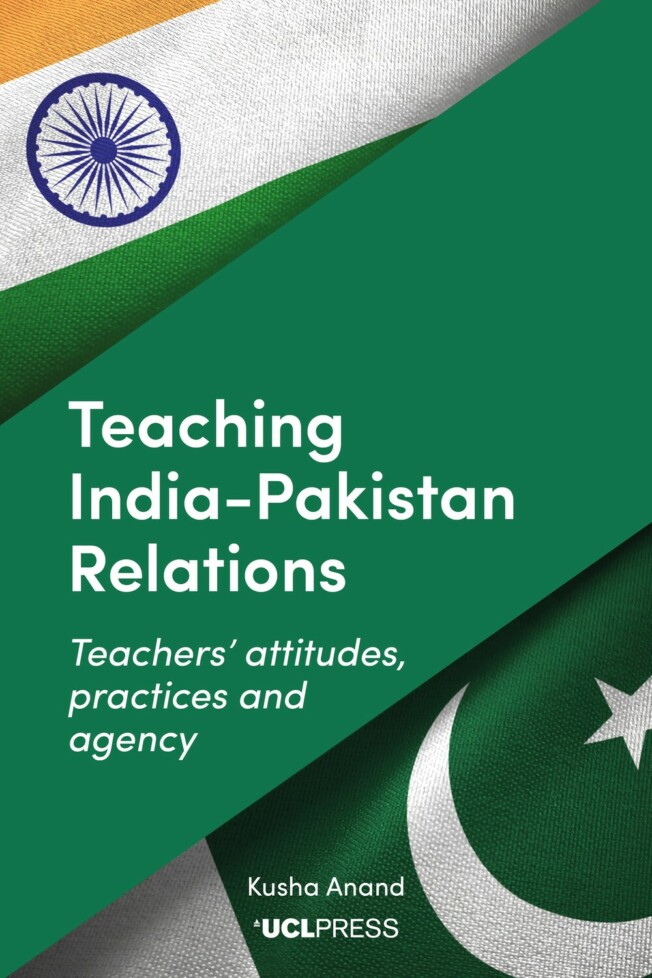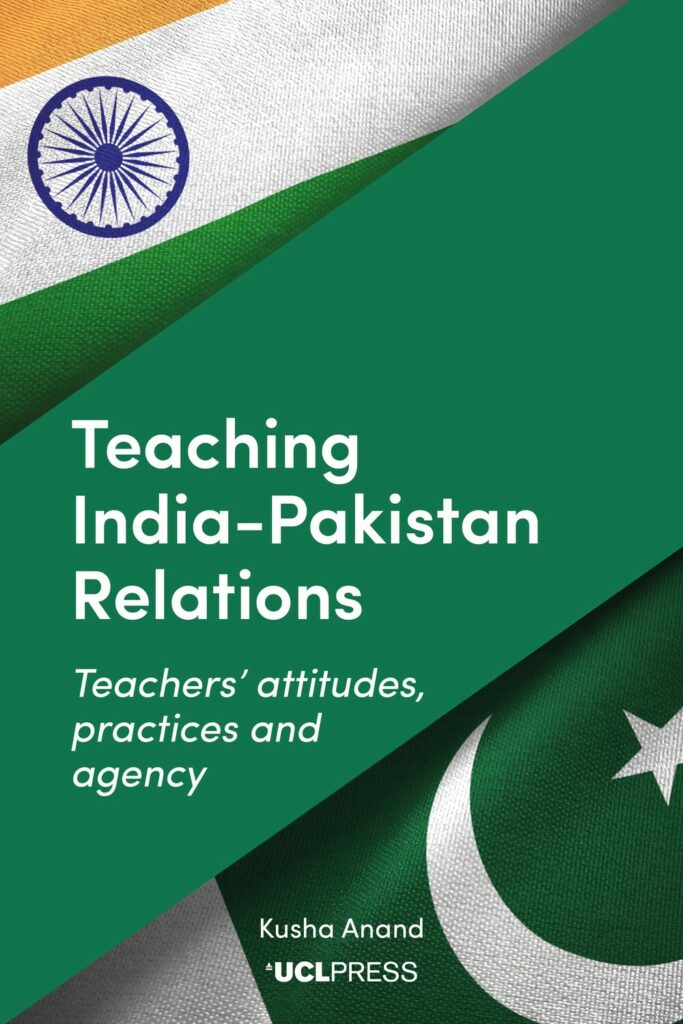
Teaching India–Pakistan Relations
Exploring teachers' voices
Kusha Anand (Author)
The rivalry between India and Pakistan began on British withdrawal from the British Indian Empire in 1947, and with the sudden partition of India immediately afterwards. It has proven remarkably resilient. While the countries share a long history and have considerable social–cultural affinity, relations since Partition have been marked by three wars, constant border skirmishes and a deep distrust that permeates both societies. In each, teaching about those relations is weighted with political and cultural significance, and research shows that curriculums have been used to shape the mindset of new generations with regard to their neighbouring state.
This book explores the attitudes and pedagogical decision-making of teachers in India and Pakistan when teaching India–Pakistan relations. Situating teachers in the context of reformed textbooks and curriculums in both countries that explicitly advocate critical thinking and social cohesion, Kusha Anand explores how far teachers have enacted these changes in their classrooms. Based on data collected from teachers via semi-structured interviews and classroom observations in India and Pakistan she argues that, despite whole-nation policies and texts, teaching of India–Pakistan relations is dependent on the socio-economic status of schools. While there is progress towards the stated goals, teachers in both countries face pressures from the interests of school and state, and often miss opportunities to engage with multiple perspectives and stereotypes in their classrooms.
Praise for Teaching India-Pakistan Relations
‘This book reflects a deep appreciation for historical complexity’
National Identities
List of figures and tables
Acknowledgements
1 Introduction: education and India–Pakistan Relations
2 Education and national identity construction in India and Pakistan
3 Teachers and teacher agency in India and Pakistan
4 Teachers’ attitudes towards India–Pakistan relations
5 Teachers’ pedagogical strategies to India–Pakistan relations: what happens in the classroom?
6 Conclusion: socio-economic status of schools and teachers
Appendix A: Snapshot of each teacher participant in Delhi and Lahore
References
Index
DOI: 10.14324/111.9781800080430
Number of illustrations: 1
Publication date: 06 February 2023
PDF ISBN: 9781800080430
EPUB ISBN: 9781800080461
Hardback ISBN: 9781800080454
Paperback ISBN: 9781800080447
Kusha Anand (Author) 
Kusha Anand is a Research Associate at the UCL Institute of Education where she was awarded her PhD in Political Sociology of Education in 2019. Her thesis looked at how the history of India-Pakistan relations is enacted in schools in Delhi and Lahore. She has over a decade of fieldwork experience on several interdisciplinary projects liaising with policymakers, teachers, EdTech entrepreneurs, and NGOs in India.
‘This book reflects a deep appreciation for historical complexity’
National Identities
‘In a context of increasing geopolitical tensions globally and in which efforts have been made to silence teachers and other education personnel from discussing critical topics in the classroom, Teaching India–Pakistan Relations provides an important and timely contribution to animating the agency of teachers as critical transformative agents. Drawing on in-depth, conceptually rich and historically grounded research, this book bravely traverses how India-Pakistan relations are featured in textbooks in both countries, and are mediated by teachers. Teacher agency, exercised within specific socio-economic, historical and cultural context, emerges as a powerful force in explaining how the curricula ambitions of governments are shaped and (re)shaped in the classroom context. The books provides a powerful and insightful analysis of possibilities and limits of teacher agency and their beliefs for education policy change and reform efforts. As such this book is a key text for educators, teacher educators, researchers and policymakers, and all those seeking to understand how sensitive and controversial topics can become part of a broad-based, holistic and transformative education offering. The book provides important pointers to how teachers can empower learners to live together and build the condition for just and durable peace in an increasingly polarised, unstable, and unequal world.’
Yusuf Sayed, Professor of Education, University of Cambridge
Related titles
Teaching India–Pakistan Relations
Exploring teachers' voices
The rivalry between India and Pakistan began on British withdrawal from the British Indian Empire in 1947, and with the sudden partition of India immediately afterwards. It has proven remarkably resilient. While the countries share a long history and have considerable social–cultural affinity, relations since Partition have been marked by three wars, constant border skirmishes and a deep distrust that permeates both societies. In each, teaching about those relations is weighted with political and cultural significance, and research shows that curriculums have been used to shape the mindset of new generations with regard to their neighbouring state.
This book explores the attitudes and pedagogical decision-making of teachers in India and Pakistan when teaching India–Pakistan relations. Situating teachers in the context of reformed textbooks and curriculums in both countries that explicitly advocate critical thinking and social cohesion, Kusha Anand explores how far teachers have enacted these changes in their classrooms. Based on data collected from teachers via semi-structured interviews and classroom observations in India and Pakistan she argues that, despite whole-nation policies and texts, teaching of India–Pakistan relations is dependent on the socio-economic status of schools. While there is progress towards the stated goals, teachers in both countries face pressures from the interests of school and state, and often miss opportunities to engage with multiple perspectives and stereotypes in their classrooms.
Praise for Teaching India-Pakistan Relations
‘This book reflects a deep appreciation for historical complexity’
National Identities
‘This book reflects a deep appreciation for historical complexity’
National Identities
‘In a context of increasing geopolitical tensions globally and in which efforts have been made to silence teachers and other education personnel from discussing critical topics in the classroom, Teaching India–Pakistan Relations provides an important and timely contribution to animating the agency of teachers as critical transformative agents. Drawing on in-depth, conceptually rich and historically grounded research, this book bravely traverses how India-Pakistan relations are featured in textbooks in both countries, and are mediated by teachers. Teacher agency, exercised within specific socio-economic, historical and cultural context, emerges as a powerful force in explaining how the curricula ambitions of governments are shaped and (re)shaped in the classroom context. The books provides a powerful and insightful analysis of possibilities and limits of teacher agency and their beliefs for education policy change and reform efforts. As such this book is a key text for educators, teacher educators, researchers and policymakers, and all those seeking to understand how sensitive and controversial topics can become part of a broad-based, holistic and transformative education offering. The book provides important pointers to how teachers can empower learners to live together and build the condition for just and durable peace in an increasingly polarised, unstable, and unequal world.’
Yusuf Sayed, Professor of Education, University of Cambridge

